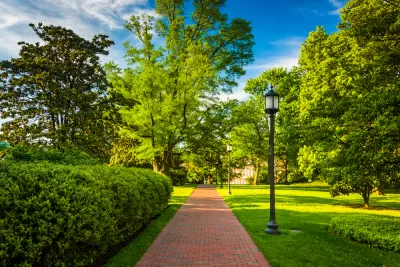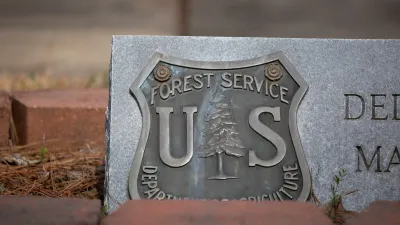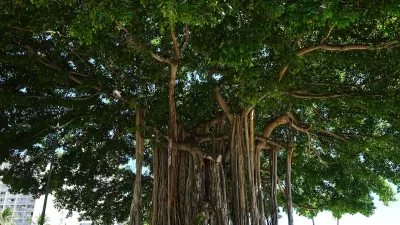The U.S. Forest Service has continued to refine the valuable i-Tree software program, which allows cities to calculate the benefits, in dollar figures, of the urban forest.

Laura Bliss reports on the work of David Nowak, a lead researcher at the U.S. Forest Service’s Northern Research Station in Syracuse, New York, and one of the founding developers of the Forest Service's i-Tree software programs.
The i-Tree system uses GIS and a complex set of algorithms, to provide "detailed inventories of their urban canopies, and calculate their dollar value." Bliss details how the i-Tree program worked for a study of Austin's urban forest in 2014 [pdf]:
A recent i-Tree analysis of Austin, Texas, led by Nowak, estimated that trees save that city nearly $19 million annually in reduced building-energy use, some $5 million in reduced carbon emissions, and account for about $16 billion as standalone physical assets. Past that, they’re worth $3 million per year in their reduction of air pollution (based on avoided respiratory health problems), and nearly $12 million per year in the amount of carbon they sequester.
The i-Tree system has been collecting new metrics since it was first released in 2006, but Nowak is still working to add more ways to quantify the benefits of trees. "Right now, some of Nowak’s work is focused on calculating the dollar value of the reduced air temperatures and absorbed UV radiation that trees provide," according to Bliss.
The article includes more about the additional potential for the i-Tree program, as well as additional findings the program has revealed about urban forests around the country.
FULL STORY: What Are Trees Worth to Cities?

Planetizen Federal Action Tracker
A weekly monitor of how Trump’s orders and actions are impacting planners and planning in America.

Maui's Vacation Rental Debate Turns Ugly
Verbal attacks, misinformation campaigns and fistfights plague a high-stakes debate to convert thousands of vacation rentals into long-term housing.

San Francisco Suspends Traffic Calming Amidst Record Deaths
Citing “a challenging fiscal landscape,” the city will cease the program on the heels of 42 traffic deaths, including 24 pedestrians.

Defunct Pittsburgh Power Plant to Become Residential Tower
A decommissioned steam heat plant will be redeveloped into almost 100 affordable housing units.

Trump Prompts Restructuring of Transportation Research Board in “Unprecedented Overreach”
The TRB has eliminated more than half of its committees including those focused on climate, equity, and cities.

Amtrak Rolls Out New Orleans to Alabama “Mardi Gras” Train
The new service will operate morning and evening departures between Mobile and New Orleans.
Urban Design for Planners 1: Software Tools
This six-course series explores essential urban design concepts using open source software and equips planners with the tools they need to participate fully in the urban design process.
Planning for Universal Design
Learn the tools for implementing Universal Design in planning regulations.
Heyer Gruel & Associates PA
JM Goldson LLC
Custer County Colorado
City of Camden Redevelopment Agency
City of Astoria
Transportation Research & Education Center (TREC) at Portland State University
Jefferson Parish Government
Camden Redevelopment Agency
City of Claremont





























